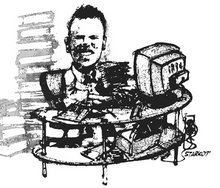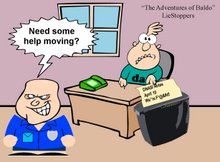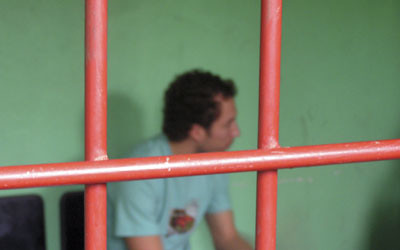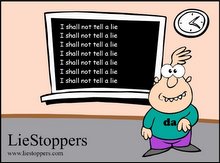Scapegoatology 101, Part 1 of 4
- No one is going to look to your sins, your guilt, or your part in anything bad. They’re going to look to the scapegoat.
- YOU will be much less likely to reflect on your errors, your guilt, or your part in anything bad. You’ve just cleansed your conscience.
There are other potential benefits to be derived as well – we’ll get into those later.
Ahh, but wait! There is more to the original story of the scapegoat. On one occasion, a scapegoat returned to the city from which it had been led. This was considered such an evil omen that the annual ritual was changed. From that point on, the man leading the scapegoat into the wilderness was instructed to push the unhappy beast over a cliff, thus ensuring its death and precluding any possibility that the sins visited upon it might be returned to the city from whence it had been cast out.
This points out that to scapegoat effectively, you’d better do your scapegoating right!
An overview of the scapegoating process:
So, ok, you’ve now decided to study the wonderful art and science of scapegoatology (the study of scapegoating, which is a social science, by the way) or to try your hand at doing some scapegoating. How do you go about it? The basic concepts and the process of scapegoatology are relatively simple, in theory (it is the practical application of the theory that can become complex):
- Articulate your overriding goal(s);
- Choose (or create) the transgressions to be placed;
- Pick (or create) an appropriate scapegoat;
- Place the offense squarely and firmly on your selected scapegoat;
- Make sure everyone else is looking at the scapegoat for the foul and nowhere else;
- Push your scapegoat out into the wilderness;
- Make sure your scapegoat goes over a cliff;
- Milk it for everything you can; and
- Look for your next opportunity.
Goals of Scapegoating:
There can be many ultimate reasons you might want to create (or find) and then use a scapegoat. You might want to enhance others’ perceptions of your ability to do so (as in, effectively making a statement of “I’m really good at this, and have power, so you never, ever want to nifong with me!”). You may want to reinforce in others the thought that the scapegoat, or the herd of goats your particular scapegoat is coming from, is an appropriate herd from which to choose (as in, All Duke lacrosse players, being white, male, privileged, “racist,” “hooligans,” “sexist,” etc. are appropriate and useful targets for scapegoating and henceforth can be used as such by any other person or group who might want to). It may be to further some agenda you may have (such as, I need to form a committee, which I and my co-scapegoaters will stack, to impose our views on appropriate diversity programs upon the unsuspecting underclassmen at Duke – and, by the way, additional funding for our activities and pet programs and projects would also be nice). You may even want to ride the back of your scapegoat through an election process, and get elected by vilifying a scapegoat that a significant voting demographic already hates on an institutional basis.
There are many possible goals – just be sure you can articulate (to yourself only) what your goals are. But it wouldn’t really do to articulate them to others – at least, not as a part of your initial scapegoating efforts. If you do that, there is a substantial risk that others might find out and resist your attempts to cast sins on the poor scapegoat. So, know where you want to go, but keep it to yourself until the opportune moment! Others might not want to follow if they understand where you’re heading.
The reason you want to know your ultimate goal, however, is important. It will have a direct influence on your selection of the method you will use to fix blame, your choice of a scapegoat, and the way you get others on board.
Regardless of your ultimate purpose, your goal with respect to the scapegoating process itself is to have everyone giving horror-filled looks at your chosen scapegoat – not at you. You want everyone condemning the scapegoat – not you. You are placing all offenses on the scapegoat – nowhere else, and above all else, not upon yourself. After all, if everyone’s looking at the scapegoat’s transgressions, they certainly won’t be paying any attention at all to what you are doing, let alone worrying about your ultimate goals as a scapegoater or the hidden agenda you are trying to further. And, for you as the scapegoater, that’s a good thing!
End of Part 1. Next Part: A Proposed Scapegoatology Course Guide.
Brand














































8 comments:
funny you should write about scapegoats; the defense is obviously using Nifong as one. He is no longer with the case and the defense is still bringing him back up
What a well written and informative work. The layout of your peice is both correct and allows the reader to follow where you would like them to go.
Your use of irony is pleasing to the educated persons reading your work.
I regret to inform you that there are limited spots available for faculty who are able to write a cogent article. Your application
to serve on the CCI is DENIED - don't quit your day job!
Far Flung Jen
is this to be one of the required courses that the CCI is demanding?
5:47-it ain't scapegoating if the target has actually committed crimes and ethical violations !
Well, Nifong is being scapegoated by the University and the Group of 88. One of their excuses is Nifong, as if they are not responsible for their own behavior. They used no common sense. Their lack of judgement is merely reflective of their lack of character. Nifong is to be blamed lacking their acceptance of responsiblity since they cannot contiue to demonize the lacrosse team. Someone has to be the scapegoat and excuse all others of responsibility.
No, 5:47 a.m, the defense is not scapegoating Nifong. The very definition of scapegoating is ascribing blame to someone who is innocent, and Nifong is guilty as sin and twice as ugly. It is his actions, words, gross misconduct, and manipulations that have led to the current problem, so although he belatedly recused himself from the case, his activities and statements up to that point are still germaine. Hopefully, they will lead to his disbarment and removal from public office. What happens beyond that is a matter for law enforcement, and I think this case would demand a special prosecutor, preferably one from out of state.
What wonderful creativity. I think the next class description should be on campus speech codes, such as the one at Mich. State U. which requires mandatory re-education for anyone making any comment that in any way hurts or insults another. We can just call it the "Pol Pot Symposium."
Of related interest:
"The Race Hoax Handbook:
Twelve Steps To Bigger, Better, Race Hoaxes."
http://nicholasstixuncensored.blogspot.com/2007/01/race-hoax-handbook-twelve-steps-to.html
It looks like that link didn't travel well, so I'll try again, this time breaking it up.
http://nicholasstixuncensored.blogspot.com/
2007/01/race-hoax-handbook-
twelve-steps-to.html
Post a Comment